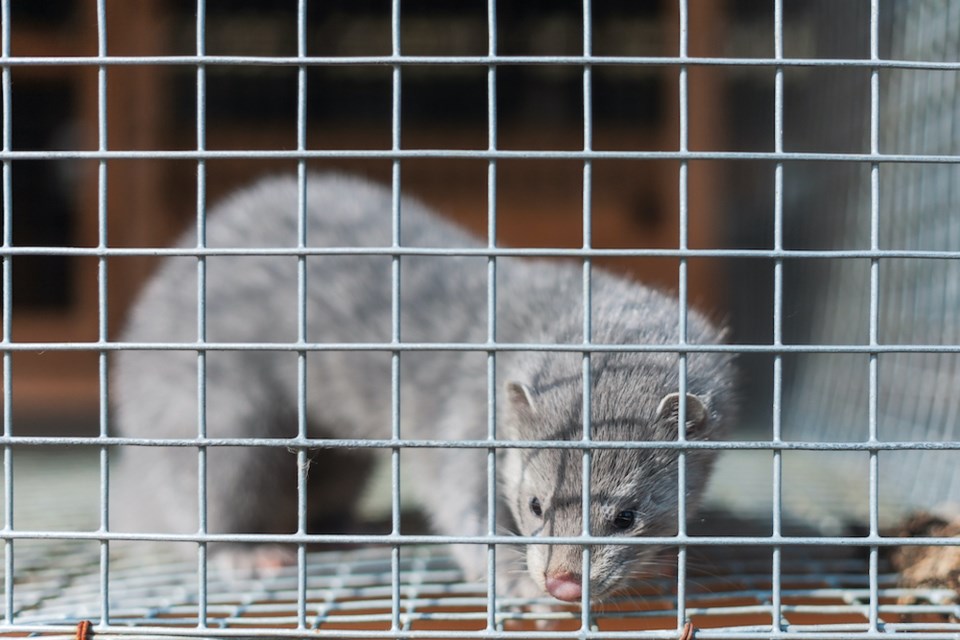The Union of BC Indian Chiefs (UBCIC) has announced that it is joining the BC SPCA and other advocates as they call for a moratorium on mink farming in B.C.
Over the course of the pandemic, COVID-19 has spread rampantly at mink farms in Europe and North America, most notably resulting in Denmark’s drastic decision to cull all 15 million minks bred at its 1,139 mink farms. The how a rushed cull of minks after a massive outbreak has resulted in deceased mink "rising from their graves" after they were buried in shallow pits and their postmortem, bloated bodies rose up from the earth.
However, as other nations accelerate plans to phase out and ban fur farms, the B.C government recently announced the resumption of mink breeding at mink farms, including at one farm that is still under quarantine. Last December, two hundred mink died and another 1,000 were euthanized as a precaution after mink at two Fraser Valley farms tested positive for the coronavirus.
“It may be surprising to many that British Columbia has a fur farm industry which revolves around the mass breeding and slaughtering of wild animals for luxury fashion items and has been widely regarded as unethical and unnecessary,” stated Grand Chief Stewart Philip, UBCIC President.
“UBCIC supports the ethical harvesting of fur for cultural and ceremonial purposes, and for purposes that align with Indigenous ways and respect values of conservation and stewardship. However, UBCIC does not condone the industrial breeding, confinement and slaughtering of minks for international luxury markets especially as, notwithstanding the current public health risks, mink farms have long been implicated in cruel and inhumane fur farming practices that have led to unacceptable animal welfare outcomes. Evidence exists on both local and international scales regarding the unnecessary and deeply troubling suffering minks are subjected to – lifelong confinement in cramped and filthy cages which, during a pandemic, only promotes the spread of COVID-19 and other respiratory viral infections.”
A new organization launches in the fight to end fur farming in B.C.
On Monday (April 5), a new organization formally launched in B.C. called Ban Fur Farms British Columbia (BFF BC).
The organization cites the ban on fur farming as long overdue, drawing attention to the detrimental relationship of fur farms to the Covid 19 pandemic. "At the end of 2020, several BC mink farms reported Covid outbreaks, resulting in the deaths of over 1,000 mink. Still under quarantine, the same facilities began operations for the year in late March, opening the door for a myriad of environmental concerns, public health considerations, and mass animal abuse," explains a release.
BFF BC co-founders Amy Soranno (Meat The Victims Canada, Shutdown Patton), Harpreet Bhullar (Co-founder; Richmond Farmers Protest Initiative), Olivia Weber (Shutdown Patton) and Zoe Peled (ΒιΆΉ΄«Γ½Σ³»Vegan Resource Centre, March to Close All Slaughterhouses), are leading the initiative, which seeks to engage the public to put pressure on their local MLA’s and government to take action.
Peled tells ΒιΆΉ΄«Γ½Σ³» in an interview that the reason why fur farms are under the spotlight at this time is because of the role they've played in the pandemic. "The very set up of the industry is almost providing an ideal environment for transmission to occur. That is a huge issue for animals and for public health, especially since we are in the third wave of the pandemic.
"We want to broaden the conversation. We need to look at this industry and this dialogue not only as an animal issue. What happens on those fur farms extends far beyond those properties and animal lives and into human lives."
"Problematic for animals, the environment, and human health."
Lesley Fox, executive director of The Fur-Bearers, told ΒιΆΉ΄«Γ½Σ³» in a previous interview that COVID-19 outbreaks aren't unexpected given the conditions on fur farms.
Fox said fur farms are "problematic for animals, the environment, and human health," regardless of the type of animals being farmed.
"On one farm you have tens of thousands of individuals--and the keyword is individuals. And so, when you have one of those individuals that's sick, the capacity to spread that virus is certainly a domino effect," explains Fox.
Recently, Research Co. polled North Americans on several issues related to animals. The support for killing animals for their fur was extremely low, with the overwhelming majority--81 per cent of Canadians and 75 per cent of Americans--opposed to killing animals for their fur.
Environmental icon David Suzuki and four other scientists have also called on the Canadian government to put an end to fur farming in the country in a letter addressed to Lana Popham, B.C.’s Minister of Agriculture and Katrine Conroy, B.C.’s Minister of Forests, Lands, Natural Resources and Rural Development.
--With files from Mario Canseco.


